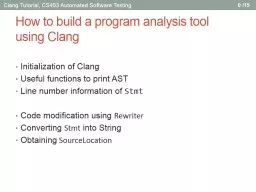PPT-Clang-tidy for Customized Checkers and Large Scale Refactoring
Author : ceila | Published Date : 2024-01-03
Vince Bridgers Overview Why use tools like Syntax and Static Analyzers How do these tools fit into a process flow Examples of text matchers using clangquery compare
Presentation Embed Code
Download Presentation
Download Presentation The PPT/PDF document "Clang-tidy for Customized Checkers and L..." is the property of its rightful owner. Permission is granted to download and print the materials on this website for personal, non-commercial use only, and to display it on your personal computer provided you do not modify the materials and that you retain all copyright notices contained in the materials. By downloading content from our website, you accept the terms of this agreement.
Clang-tidy for Customized Checkers and Large Scale Refactoring: Transcript
Download Rules Of Document
"Clang-tidy for Customized Checkers and Large Scale Refactoring"The content belongs to its owner. You may download and print it for personal use, without modification, and keep all copyright notices. By downloading, you agree to these terms.
Related Documents














